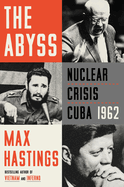
In The Abyss, popular historian Max Hastings (Operation Pedestal; Operation Chastise; Vietnam) delivers a magisterial re-evaluation of the 1962 Cuban Missile Crisis for general readers and a "new generation... outside the defense and academic communities." Hastings, contextualizing the geopolitical situation in 1962 as it existed for the U.S., the Soviet Union and Cuba, addresses one of the main points about the crisis that is often "missed": it was always a "political issue, not a strategic one."
After President John F. Kennedy's Bay of Pigs debacle, the Soviet Union--under the leadership of its "boorish" First Secretary Nikita Khrushchev--resolved to defend Cuba from any future invasions by secretly shipping Soviet nuclear weapons to the island and its revolutionary prime minister, Fidel Castro. Thus ensued almost two weeks of nerve-shattering brinkmanship between the world's two nuclear superpowers, which Hastings details through primary sources and research. He concentrates on "the contradiction at the heart of Khrushchev's strategy" that pitted his knowledge of the Soviet Union's likely annihilation (at the hands of U.S. nuclear superiority) with the aim of exploiting the West's terror of nuclear war--all to gain tactical successes abroad.
This people-focused history weds colorful portraits and sharp observations: both Kennedy and Khrushchev were "profoundly apprehensive" about the crisis, while Castro "was exalted by it. Addicted to drama, he saw himself as his people's Man of Destiny." The Abyss, impressively organized and enthralling in its intensity, is another satisfying offering from Hastings and is replete with lessons for today's volatile world. --Peggy Kurkowski, book reviewer and copywriter in Denver

